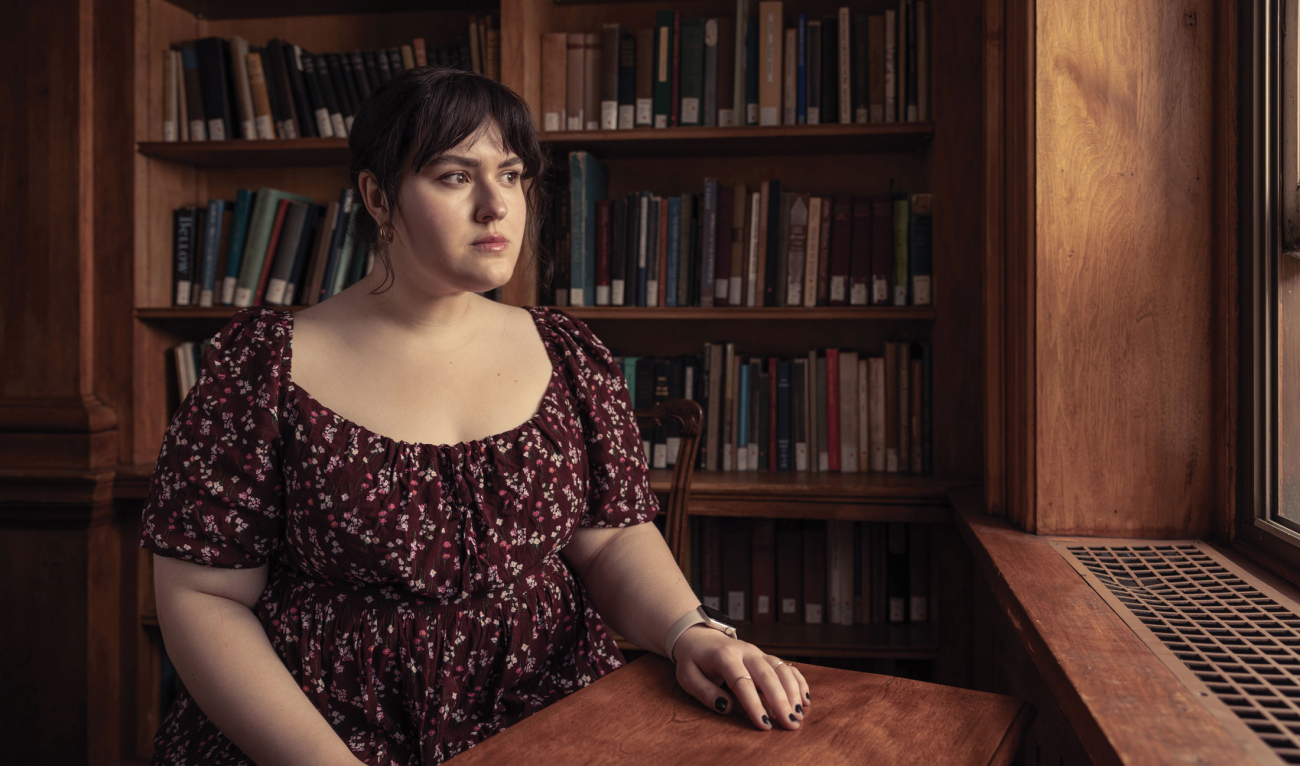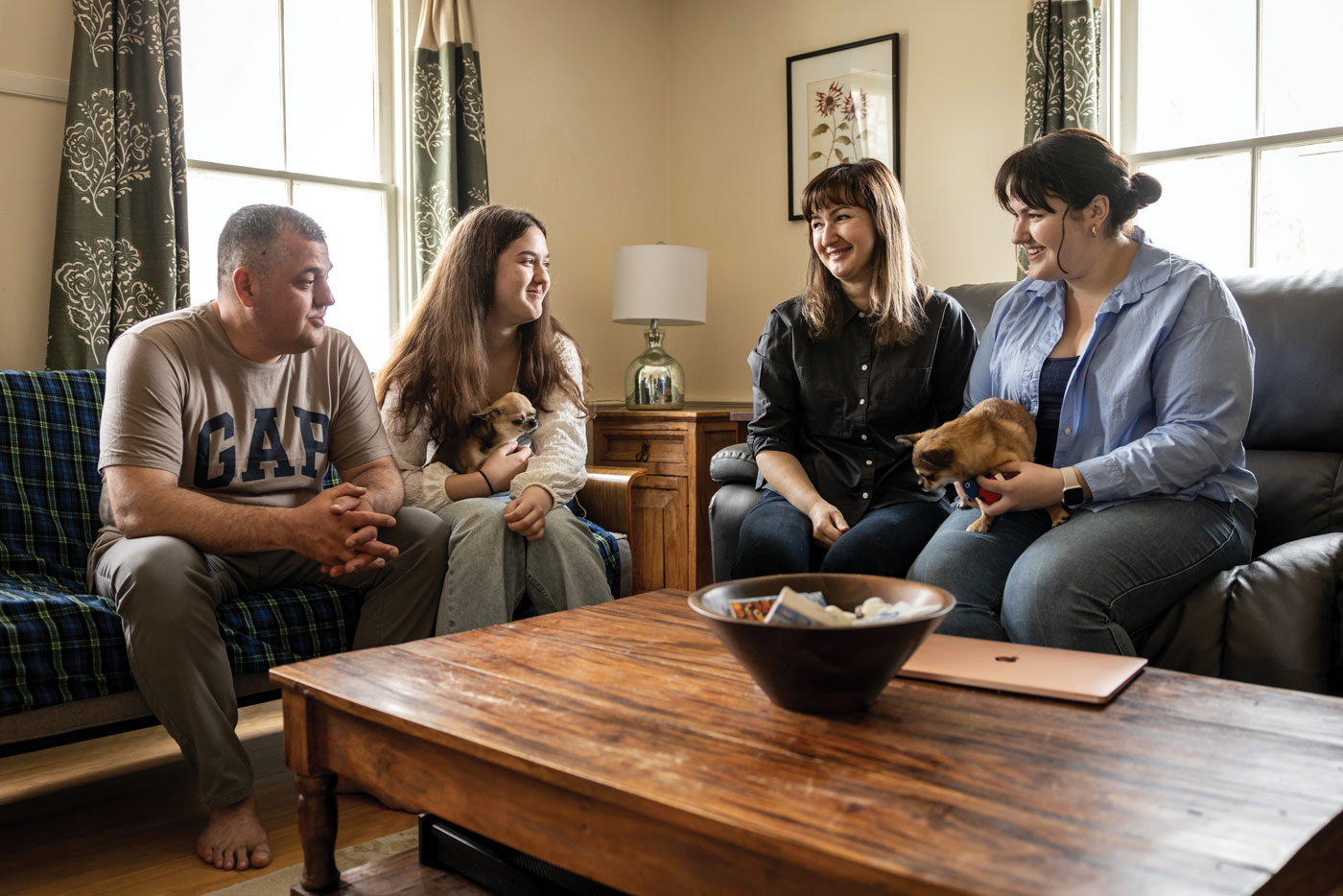Long Way From Home
On a breezy day in late September, Zhenia Dubrova sat in her English class fidgeting as professor Patricia McKee discussed Toni Morrison’s novel Home. She checked her phone every few minutes, hoping for a message from her parents.
Four days earlier, Dubrova’s mother, Iryna, 51, and father, Oleksandr, 45, had fled their home in the Russian-occupied separatist region of Donetsk Oblast in eastern Ukraine. Dubrova knew they had crossed into Russia en route to the airport in Georgia. She had booked plane tickets that would fly them from Tbilisi to Munich, and then Boston. Because she had no way to know how long the journey to Georgia would take, she’d made her best guess for their itinerary and left room for possible delays. “My parents’ flight was the next day, and I hadn’t heard from them,” Dubrova remembers. “I was so worried, I couldn’t focus all day.”
Dubrova had been trying to get her sister, parents, and the family’s two chihuahuas out of the country since February 24, 2022, when Russia launched a full-scale invasion of Ukraine. Dubrova’s father feared he would be drafted into the Russian army if he remained in Donetsk. Her younger sister, Arina, was already hiding in a bomb shelter in central Ukraine.
When the U.S. Department of Homeland Security announced its Uniting for Ukraine program in April 2022, offering Ukrainian refugees a two-year provisional haven in the United States, it felt like a miracle to Dubrova. It was also a long shot. The border from Donetsk into Ukraine had closed during the pandemic, so the only way in or out was through Russia.
Dubrova is one of many Ukrainians living abroad and navigating a labyrinth of paperwork, legal proceedings, and fundraising to usher their families to safety from afar. With scant resources of her own, she had to rely on her small network of friends and professors to find volunteers willing to sponsor her family, provide housing, and assist with legal matters.
War separates families with callous ease. Reuniting them is far more difficult.
Dubrova's mother worked as the principal of a daycare center for children with disabilities. Her father was a construction worker, and her younger sister loved to draw. Growing up in the Donetsk region, Dubrova loved to spend time with her grandmother, who helped her write poems. But in 2014, when Dubrova was 13, her hometown became enveloped in a war instigated by Russian-backed separatists—a war that has never ended.
“I came to school one day and some of my classmates were wearing Russian symbols attached to their uniforms and chanting pro-Russian slogans,” Dubrova says. Soon, she was one of only three students in her seventh-grade class who still identified as Ukrainian.
Their city—which Dubrova asked not be identified out of safety concerns for relatives who still live there—became a part of the Donetsk People’s Republic, an unrecognized republic of Russia. Dubrova’s parents secretly watched Ukrainian news at home and taught Arina Ukrainian. The family left in 2014 to live with relatives in Poltava Oblast, about 270 miles northeast of their home, and Dubrova remained there when her parents and sister later returned home to take care of her grandparents.
This early experience of war and separation from her parents left a mark on Dubrova. “Leaving at 13, it really changed me,” she says. “I had to grow up fast.”
A few years later, she won a scholarship to St. Mark’s School in Massachusetts and then was admitted to Dartmouth with full financial aid. One of seven Ukrainian undergrads on campus, she is majoring in creative writing and minoring in Middle Eastern studies.
In the month after the February 2022 invasion, Dubrova barely slept as she followed the news from her dorm room in Topliff. “You have a map of Ukraine constantly in your head and you think, I have my family here, my friends here, my teacher here,” she says, “and there are bombs going off here and here.”
She first took steps to evacuate her sister, whom their parents had sent back to Poltava in September 2021. With Ukrainian professor Victoria Somoff, Dubrova organized a group of campus and Upper Valley volunteers to provide legal and financial support. Somoff sought help from Ukrainian professor Yuliya Komska, who teaches German studies. Using contacts from Dartmouth’s study abroad program, Komska helped track down host families in Berlin for Arina, starting in March 2022. The network bloomed to include 14 volunteers in the broader Upper Valley area, most of them members of Shir Shalom, a synagogue in Woodstock, Vermont.
Somoff, who teaches Russian literature, was moved to help Dubrova out of her sense of duty as a teacher and a Ukrainian, but also as a fellow native of the Donetsk region. “That was an immediate connection I had with Zhenia and her parents,” she says.
After two potential Upper Valley host families for her sister fell through, Dubrova allowed herself only a moment to despair. “I knew I couldn’t just cry 24/7,” she says. “I needed to focus on finding the next best option.” She often visited Somoff’s office between classes to brainstorm the next step. “I was so anxious all the time. I had to manage schoolwork, obviously, jobs outside of that, do volunteer work to help other Ukrainians, and on top of all that figure out what to do with my family.” Her concerns often made for a jarring contrast with the lively campus life around her. “People are having a good time, partying, and just being young students, and it’s always kind of strange catching yourself,” she says. “It sometimes makes me feel like I’m in some sort of simulation and I’ve been placed in the wrong one.”
In June 2022, Shir Shalom’s rabbi asked Halley Silver and her husband, Kirt Johnson, if they could house the 14-year-old Ukrainian refugee. The couple had recently sent their last child to college and had two empty bedrooms at their home in Hartland, Vermont. To them, it seemed like kismet. “This was a way we could be helpful,” says Silver.
Arina, as a minor, had to be accompanied by a legal guardian to enter the United States. During the summer, Silver and Dubrova were granted temporary guardianship of Arina in a Zoom hearing with Dubrova’s parents. Dubrova flew to Germany and returned with her sister. By early September, she and Silver were rushing Arina to doctor appointments, filing applications for reduced-price school lunches, and giving her time to adjust. “Part of my role was to ease the burden on Zhenia,” Silver says, “and what a burden was on that girl’s shoulders.”
Silver assumed that Arina would stay with her indefinitely. Given the hurdles and dangers, she doubted that Dubrova’s efforts to bring her parents to the United States would succeed. “The plan was just so insane,” she says.
But the morning after that English seminar, Dubrova woke to a flood of Facebook messages from her father, some dated several days earlier, when her parents had been without an Internet connection. The most recent message allowed her to finally exhale. They had crossed into Georgia, walking the final 12 kilometers to the border, each carrying two suitcases—and a chihuahua strapped to their chests.
In the arrivals section of Boston Logan airport, they squeezed each other as if to make sure they really were there.
Soon, Dubrova—who hadn’t seen her parents since August 2021—would be in a dizzying, dreamlike embrace, her parents saying words she can no longer remember, the dogs licking her face. “I was relieved and happy,” Dubrova says, “but since the war began, it has become difficult for me to experience strong emotions. I didn’t cry or anything.” In the arrivals section of Boston Logan airport, they squeezed each other as if to make sure they really were there.
Leaving Donetsk and selling the family’s apartment was tough, particularly for Dubrova’s mother. “They were very, very anxious coming and had a lot of doubts every day, from the moment they applied for the program until the moment they left,” Dubrova says. “I think they kind of knew that they would go, but still there are all these uncertainties about leaving your life behind.”
When Dubrova’s parents arrived at the end of September, Silver and Johnson invited them to live in a home they own in Hartland. “We can’t say no,” Silver recalls telling her husband. The volunteers had pooled donations to help provide for the family for a year, until Dubrova’s parents obtained work permits and a source of income.
On a Saturday evening in early December, Dubrova sat with her family in their home. A sheet of rain fell noiselessly outside, the treetops clouded in heavy fog. Mounted above the front door of the white wood-paneled house was a Ukrainian flag. “It was natural to me that I had to help my parents and sister,” Dubrova says. “It’s not me being brave or mature. It’s just the reality. You have to take responsibility and just do it.”
The family relaxed around the dinner table, with its simple but hearty spread of chicken, potatoes, and pickled vegetables. Her parents still showed signs of adjusting to their new life—Dubrova’s father was exhausted after his first week at a new job, stocking merchandise at Dan & Whit’s general store in Norwich, Vermont, and her mother bemoaned the irregularities of English verb conjugation. But after putting the dishes away, the family settled into loveseats to watch The Great British Baking Show. A portable heater beeped every so often in the corner. Her parents carefully followed the English subtitles.
Dubrova plans a return to Ukraine this summer—to unoccupied areas—where she’ll work on a novel and volunteer however she can. For now, she is grateful for her family’s good fortune, even as she grapples with how to feel when so many others remain in peril. “I’m just processing all of it now,” she says. “Before this, I was the person who would make a four-year plan, so it’s very difficult not to know what’s going to happen tomorrow. But at least we are all here together right now.”












